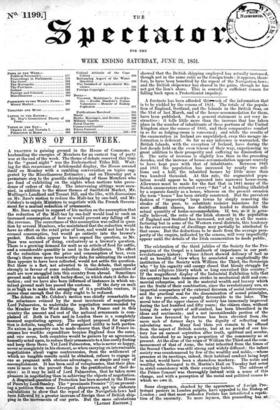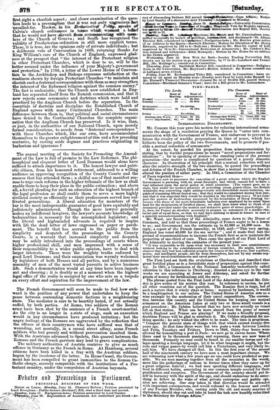Some cler g ymen, shocked by the appearance of fcrei g n Pro- testant
pastors in London pulpits, have appealed to the Bishop of London; and that most orthodox Prelate has interdicted n repeti- tion of the enormity. To mere laymen, this proceeding has at first eight a churlish aspect ; and closer examination of the ques- tion leads to a presunkptian that it was net lonly uagmcious hut uncalled-for. Hooker, in his Eeclesiastica Polity, speaks elf Calvin's church ordinances in terms whidh war:rant a lairmf that he would not have adtrimk iron scominunicatiAg with mew bers of the Church of •Geneva; and South has recognized 'the validity of Presbyterian ordination in still more explicit terms. These, it is true, are the opinions only of private individuals ; but a deliberate vote of Convocation in 1689, returning thanks for King William's care of the Church of England, expressed fled- nese at the prospect that "the interest of the Protestant religion in other Protestant Churches, which is dear to us, will be the better secured under the influence of your Majesty's government and protection." In 1705, a letter of the Lower House of Convoca- tion to the Archbishop and Bishops expresses satisfaction at the readiness shown by foreign Protestant Churches "to maintain and cherish such a fraternal correspondence with-them as may strengthen the interest of the Reformed religion against the common enemy." The fact is undeniable, that the Church now established in Eng- land has separated itself from the Romish communion, and that it now rejects some ceremonies and doctrines which were held and practised by the Anglican Church before the separation. In the essentials of doctrine and discipline the Established Church of England agrees -with many- Continental Churches. The main difference between them is, that political and social circumstances have denied to the Continental Churches the complete organi- zation that the Anglican Church has preserved. Is at wise, then, or just, in the authorities of our National Church, upon merely formal considerations, to secede from "fraternal correspondence" -with those Churches which, like our own, have accommodated themselves to the greater enlightenment of this and a few preceding centuries, by casting aside dogmas and practices originating in barbarism and ignorance P



























